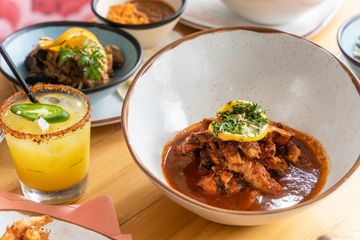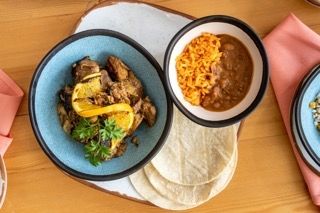Is Mexican Food Healthy And Balanced? Unboxing the Nutritional Benefits of Standard Components
The concern of whether Mexican food is healthy invites an exploration of its standard components. Beans and corn work as foundational staples, rich in healthy protein and fiber. Avocados give beneficial fats, while numerous natural herbs and flavors add flavor and health and wellness benefits - best mexican westchester NY. Together, these parts develop a tapestry of nutrition. Nevertheless, the healthiness of Mexican food often depends upon prep work methods and section dimensions. What role do these elements play in determining its total dietary value?
The Power of Beans: Protein and Fiber-Rich Staples
Frequently ignored, beans offer as a foundation of Mexican cuisine, using a wealth of nutritional advantages. Rich in protein, they are a superb plant-based option for those seeking to meet their dietary healthy protein requires. This high healthy protein web content supports muscle repair work and development, making beans important for both meat-eaters and vegetarians alike. Furthermore, beans are an extraordinary resource of nutritional fiber, which helps in digestion and advertises a sensation of volume, possibly assisting with weight monitoring.
The selection of beans used in Mexican meals, such as black beans, pinto beans, and kidney beans, adds to a diverse taste account and can boost dishes nutritionally. Beans are reduced in fat and contain essential vitamins and minerals, consisting of folate, iron, and magnesium. With each other, these qualities make beans an essential component, providing both sustenance and sustenance in typical Mexican price.

Corn: a Versatile Grain With Nutritional Advantages
Corn stands out as a flexible grain essential to Mexican cuisine, commemorated not just for its culinary applications but also for its remarkable nutritional account. As a main ingredient in dishes like tortillas, tamales, and pozole, corn offers necessary nutrients that add to a balanced diet plan. Rich in carbohydrates, it works as a considerable power resource, while likewise being low in fat, making it a beneficial choice for various nutritional demands.
Corn is an excellent resource of nutritional fiber, which aids in digestion and promotes satiety. It includes considerable quantities of vitamins such as B-complex vitamins, which are necessary for energy metabolic process. The visibility of anti-oxidants, specifically carotenoids, adds to overall health and wellness by minimizing oxidative stress. In addition, corn is gluten-free, accommodating those with gluten sensitivities. Overall, the dietary advantages of corn emphasize its significance in standard Mexican food and its role in a healthy and balanced diet.
Avocados: Healthy And Balanced Fats and Nutrients in Every Bite
Avocados play a considerable role in Mexican cuisine, enhancing recipes with their velvety appearance and rich taste. Beyond their cooking charm, avocados are commemorated for their impressive dietary profile. They are an abundant source of healthy monounsaturated fats, which can aid lower poor cholesterol levels and support heart health and wellness. In addition, avocados are loaded with important vitamins and minerals, including potassium, vitamin E, and B vitamins, adding to total health.
The high fiber content in avocados help digestion and advertises satiety, making them a beneficial enhancement to any dish. Their distinct nutrient structure can likewise sustain skin wellness and give anti-inflammatory advantages. Including avocados right into conventional Mexican recipes or enjoying them as a standalone treat can boost both flavor and nutrition, demonstrating why they are a precious staple in Mexican cuisine. On the whole, avocados use a tasty means to enjoy healthy fats and essential nutrients in every bite.

Herbs and spices: Flavorful Wellness Boosters
While taking pleasure in the abundant flavors of Mexican cuisine, one can not ignore the essential duty that spices and natural herbs play in improving both taste and health and wellness. Components such as oregano, cilantro, and chili peppers not just add to the dynamic taste profile but likewise provide considerable health and wellness benefits. As an example, cilantro is understood for its detoxifying residential properties, assisting to remove heavy take out and delivery metals from the body, while oregano is loaded with antioxidants and has anti-inflammatory results.
Chili peppers, a staple in many Mexican recipes, include capsaicin, which has actually been linked to improved metabolic process and pain relief. Additionally, seasonings like cumin and coriander support food digestion and may help in blood sugar policy. Including these tasty health boosters right into dishes not just enhances the cooking experience but also promotes general wellness, making Mexican cuisine not just tasty, however likewise nutritionally helpful.
Typical Food Preparation Approaches: Enhancing Nourishment and Flavor
Conventional cooking approaches in Mexican cuisine play an essential duty in boosting both nourishment and flavor, as they commonly focus on time-honored techniques and fresh components. Strategies such as nixtamalization, where corn is saturated and cooked in an alkaline option, not only boost the nutrient profile of tortillas however additionally enhance their digestibility - hand crafted margarita. Furthermore, using slow cooking approaches, like stewing or braising, permits flavors to meld perfectly while retaining the stability of the active ingredients
Frequently Asked Concerns
Are Mexican Food Portions Typically Larger Than Various Other Cuisines?
Mexican food portions are usually larger than those of many other cuisines. This particular reflects standard dining methods, stressing public sharing and hearty dishes, which can bring about a much more significant offering size overall.
How Does the Prep Work Method Affect Healthfulness of Mexican Food?
Prep work methods greatly influence the healthfulness of Mexican food. Strategies such as cooking or steaming protect nutrients, while frying can raise unhealthy fat web content. Choices of components and cooking styles inevitably determine total nutritional value.
Can Mexican Food Be Customized for Particular Nutritional Limitations?
Mexican food can indeed be tailored for certain nutritional limitations. Substitutions, such as utilizing corn tortillas for gluten-free diet regimens or including even more veggies, enable individuals to delight in conventional tastes while suiting different nutritional needs.
What Are Common Mistaken Beliefs Regarding Mexican Food and Wellness?
Common false impressions about Mexican food consist of the belief that it is inherently undesirable, extremely zesty, and exclusively focused on fats. In fact, standard dishes often feature healthy active ingredients and can be tailored to numerous nutritional requirements.
Are There Much Healthier Alternatives at Mexican Dining Establishments?
Much healthier alternatives at Mexican restaurants often consist of barbequed meats, beans, and fresh vegetables. Selecting recipes that highlight entire ingredients and preventing heavy sauces can result in a much more nutritious dining experience, promoting total well-being.
The selection of beans utilized in Mexican recipes, such as black beans, pinto beans, and kidney beans, adds to a varied taste profile and can enhance dishes nutritionally. Avocados play a substantial function in Mexican cuisine, matching recipes with their luscious texture and rich flavor. Including avocados right into typical Mexican meals or enjoying them as a standalone snack can boost both flavor and nutrition, showing why they are a cherished staple in Mexican food. While appreciating the rich tastes of Mexican cuisine, one can not ignore the essential function that spices and herbs play in boosting both taste and wellness. Standard cooking approaches in Mexican cuisine play a vital duty in improving both nutrition and taste, as they usually prioritize fresh active ingredients and time-honored strategies.